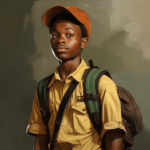— The Family
Weekend With The Family
Saturdays were never my best days. Some of my friends saw not just Saturdays but Sundays as an escape route for children who attended school.
Those days served as days where children moved about from one friend’s house to the other. Others would leave their houses to go play on the football field in one of the barracks at Obalende.
Saturdays were days where I got to go with my mother to her shop. My mother had a shop in Falomo where she sold drinks. During the day, we sold soft drinks.
Our drinks were always cold, and for this reason, we had more customers who patronized us than they did Mama Bola. At night, we would convert our shop into a bar.
Mother would often say, ‘The day is for the gentlemen, while the night is for the big boys.’ Another reminder that mother gave was that all she did was for us, the children.
Ever since Father walked out on mother and his children, mother had been subjected to running the family all by herself.
One Saturday afternoon, my mother went to Lewis Street to go get some items we weren’t having at the shop. She had left me with Tima, her salesgirl. While Tima was there helping me with my assignment, Mama Bola came into the shop to peep at us.
“Well done, my children,” Mama Bola greeted.
As if the spy hadn’t gone well the first time, she strolled past the entrance again the third time.
“Is something missing from your shop?” Tima asked
“Is that how you talk to your boss?”
“Are you now my boss?” Tima asked her this time to get ready for a fight.
“Children of these days!”
“Well, when your boss arrives, I shall tend to your matter.” Mama Bola replied as she walked back to her shop.
As if the brief exchange of words weren’t enough, Mama Bola, who sold the same items as my mother, brought out her radio and inserted her favorite tape by Rilwan, who had nothing to sing but abuse to rain on his haters.
Also Read JOAN The Writer – Two
She danced to her tape all by herself while singing out the lyrics out loud, just in case Tima’s ears were blocked.
Before my mother got to her shop, she had been spotted and delayed by Mama Pious, the bread seller.
Mama Pious was a petite woman who had a dark and attractive look. She was a young widow who had lost her husband to a fatal accident.
She had a small kiosk opposite the road where she sold bread. Beside her kiosk read a banner, ‘Mama Pious Confam Agege Bread Seller.’ She was more popular for her gossip than she was for her bread.
“You knew me before today,” Mama Pious reminded my mother, who was standing and tapping her feet.
Mama Pious noticed the gesture and urged my mother to have her sit.
“You knew me before today,” she repeated again.
“Mama Pious, please know that knowing you yesterday, today, or tomorrow will not prevent rain from falling, nor will it add anything to my purse.” My mother replied angrily.
“I see you have a lot to do,” she said, expecting my mother to affirm.
“Mama Bola has started again, but just take it easy. I saw everything that happened while you were away. But if that woman should tell you anything contrary to what your girl says, just call me. I’ll be there to narrate everything, just as I’ve done to you.”
“My sister, please don’t forget the aso ebi I told you about. It’s next month.”
“Thank you,” Mother replied.
My mother appreciated her and left her where she was still standing, expecting something more than ‘thank you.’
We got back to our normal routine of selling to customers and appreciating their patronage.
My favorite customer, Uncle Mike, came later in the evening and brought out N200 as usual after serving him his regular beer.
“Keep the change” would often accompany his thanks.
My siblings brought in the pepper soup late because it took my sister longer than usual to prepare it. My sister, Justina, was eighteen years old. A plumb, dark, and carefree girl with a bright smile. She had written her WAEC, had a poor result, but passed well after enrolling in a special center for her General Certificate Examination (GCE) at a popular center in Lagos Island. She was yet to be admitted to the university because mother never allowed her to make an attempt at writing the JAMB. Mother had insisted she wait for her brother in the United Kingdom, who had promised to sponsor her three children through the university. Two years later, Justina, while awaiting the call from the UK, helped her mother prepare the evening specials.
The bike rider who carried Justina and Jordan, my brother, to Falomo every evening charged nothing less than N150 daily. Jordan preferred sitting behind Justina as the third passenger, but she never allowed him because she was older.
“If anything happens, who will bear it? Mum or I?” She would ask, pulling his ears.
“But I’m fifteen!” Jordan would protest only to be reminded by his mother that we are Yoruba. And that no matter how little the distance in age could be, it can never be bought.
“This pepper soup will enter Aso Rock one day,” a customer teased.
Uncle Mike, after drinking a bottle of beer, requested another bottle with a plate of pepper soup.
Jordan took his order to him only for him to reject it, requesting that I deliver it to him. Jordan refused and called Justina, who in turn drew my mother’s attention.
My mother landed a slap on his light cheek, warning him to never defy a customer’s request.
I took Uncle Mike’s order to him, apologized for my brother’s attitude, and walked back to my seat.
Uncle Mike didn’t offer me any tips, as he would often do. I shrugged it off and assumed he was still angry.
Our sales for the night were a little higher than normal. Customers who ordered a plate of pepper soup requested more. And while they ate, they drank as well.
Though Jordan was asthmatic, he learned to tolerate those who smoked around him. When mother had just gotten to the shop, she worried about his medical condition. But as time went by, Jordan was able to cope with it. Years later, Jordan became asthma-free.
Mother commended Justina’s cooking skills and told her she could enroll in a cooking class sometime later to develop her skills.
The bike man arrived at 11:30 p.m. to convey us back to Okesuna. By this time, the shops around us were already closed. Tima also leaves the shop at 8pm on weekends but closes by 10 p.m. on weekdays.
Since I had a gangly body like my mother, the bike man would gently place me at the front. Mother, with her body, would sit next behind the bike man. Jordan would follow suit before Justina. Justina was the shield that prevented the wind from blowing us off the bike.
My mother was forty years old at the time. Her stature and body shape said otherwise, as people mistook her and Justina to be sisters. She saw her appearance as an advantage at some point. She had said she would rather look below her age than above it.
The next day was a Sunday. The first Sunday in the month of February 2004.
February had always been a special month for my mother because she celebrated her birthdays every 14th.
After Father walked out on his family to go start another one with a strange woman, it became a sad date, not just for mother but for the family.
Years ago, father, having returned home late in the evening, realizing it was mother’s birthday and a day lovers celebrated St. Valentine’s Day, told mom he was no longer interested in the marriage and that he was leaving her for another woman.
Mother pleaded and cried for him to at least consider me as a child who was still sucking. Her pleas fell on deaf ears.
Then mother concluded that he had been hypnotized by another woman. She cried every day as members of the family tried to unite them, all to no success. After I clocked 8, my mother sat me down and told me how, for years, she never blamed my father for once because she knew how capable a woman was and how far she could go to disrupt a peaceful home.
But in recent times, she has come to realize that only a man who wishes to be hypnotized gets hypnotized. And only a man who wishes to be separated from his family gets separated. “Let’s stop giving undue recognition to black magic,” she said.
“It’s another February,” mother announced. “Let’s make it a special one and forget all about the past,” she declared.
“We made good sales yesterday. It wouldn’t be a bad idea to go appreciate our maker.
We had our baths, dressed in our best attire, and made our way to church, where the pastor began the sermon with, “Do not consider the things of old. Behold, I make everything new!”



